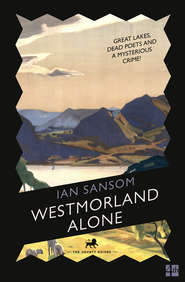По всем вопросам обращайтесь на: info@litportal.ru
(©) 2003-2024.
✖
The Norfolk Mystery
Автор
Год написания книги
2019
Настройки чтения
Размер шрифта
Высота строк
Поля
‘It was founded by?’
‘I don’t know, sir.’
‘I see. You are interested in history, though?’
‘I have taught history, sir, as a schoolmaster.’
‘That’s not the question I asked, though, Sefton, is it?’
‘No, sir.’
‘Schooled at Merchant Taylors’, I see.’ He brandished my curriculum vitae before him, as though it were a piece of dubious evidence and I were a felon on trial.
‘Yes, sir.’
‘Never mind. Keen on sports?’
‘Yes, sir.’
‘No time for them myself. Except perhaps croquet. And boxing. Greyhound racing. Motor racing. Speedway. Athletics … They’ve ruined cricket. And you fancy yourself as a writer, I see?’
‘I wouldn’t say that, sir.’
‘It says here, publications in the Public Schools’ Book of Verse, 1930, 1931 and 1932.’
‘Yes, sir.’
‘So, you’re a poet?’
‘I write poetry, sir.’
‘I see. The modern stuff, is it?’
‘I suppose it is, sir. Yes.’
‘Hm. You know Wordsworth, though?’
‘Yes, sir, I do.’
‘Go ahead, then.’
‘Sorry, sir, I don’t understand. Go ahead with what?’
‘A recitation, please, Sefton. Wordsworth. Whatever you choose.’
And he leaned back in his chair, closed his eyes, and waited.
It was fortunate – both fortunate, in fact, and unfortunate – that while at Merchant Taylors’ I had been tutored by the late Dr C.T. Davis, a Welshman and famously strict disciplinarian, who beat us boys regularly and relentlessly, but who also drummed into us passages of poetry, his appalling cruelty matched only by his undeniable intellectual ferocity. If a boy failed to recite a line correctly, Davis – who, it seemed, knew the whole of the corpus of English poetry by heart – would literally throw the book at him. There were rumours that more than one boy had been blinded by Quiller-Couch’s Oxford Book of English Verse. I myself was several times beaten about the ears with Tennyson and struck hard with A Shropshire Lad. By age sixteen, however, we victim-beneficiaries of Dr Davis’s methods were able to recite large parts of the great works of the English poets, as well as Homer and Dante. We had also, as a side effect, become enemies of authority, our souls spoiled and our minds tainted for ever with bitterness towards serious learning. But no matter. At my interviewer’s prompting I began gladly to recall the beginning of the Prelude, as familiar to me as a popular song:
Oh there is blessing in this gentle breeze,
A visitant that while it fans my cheek
Doth seem half-conscious of the joy it brings
From the green fields, and from yon azure sky.
These words seemed to please my interviewer – as much, if not more so than they would have done Dr Davis himself – for he leaned forward across the Underwood and joined me in the following lines:
Whate’er its mission, the soft breeze can come
To none more grateful than to me; escaped
From the vast city, where I long had pined
A discontented sojourner: now free,
Free as a bird to settle where I will.
He then fell silent as I continued.
What dwelling shall receive me? in what vale
Shall be my harbour? underneath what grove
Shall I take up my home? and what clear stream
Shall with its murmur lull me into rest?
The earth is all before me. With a heart
Joyous, nor scared at its own liberty,
I look about; and should the chosen guide
Be nothing better than a wandering cloud,
I cannot miss my way. I breathe again!
‘Very good, very good,’ pronounced my interlocutor, waving his hand dismissively. ‘Now. Canada’s main imports and exports?’
This sudden change of tack, I must admit, threw me entirely. I rather thought I had hit my stride with the Wordsworth. But it seemed my interviewer was in fact no aesthete, like our beloved Dr Davis, nor indeed a scrupuland like the loathed Dr Leavis, the man who had quietly dominated the English School at Cambridge while I was there, with his thumbscrewing Scrutiny,and his dogmatic belief in literature as the vital force of culture. Poetry, I had been taught, is the highest form of literature, if not indeed of human endeavour: it yields the highest form of pleasure and teaches the highest form of wisdom. Yet poetry for my interviewer seemed to be no more than a handy set of rhythmical facts, and about as significant or useful as a times table, or a knowledge of the workings of the internal combustion engine. I had of course absolutely no idea what Canada’s main imports and exports might be and took a wild guess at wood, fish and tobacco. These were not, as it turned out, the correct answers – ‘Precious metals?’ prompted my interviewer, as though a man without knowledge of such simple facts were no better than a savage – and the interview took a turn for the worse.
‘Could you give ten three-letter nouns naming food and drink?’
‘Rum, sir?’
‘Rum?’ My interviewer’s face went white, to match his moustache.











